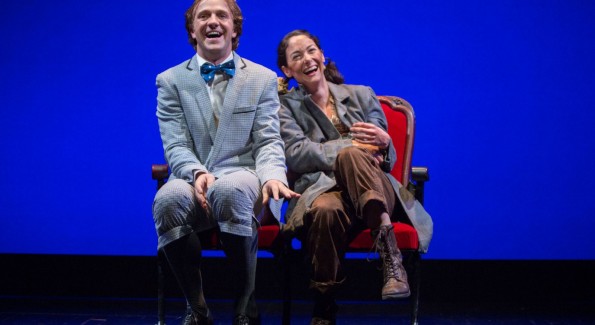Though the laughs in Studio Theatre’s ‘Laugh’ may be strained at times, the quirky play is pleasant.

Creed Garnick (Roscoe) and Helen Cespedes (Mabel) in Studio Theatre’s “Laugh.” (Photo by Igor Dmitry)
Studio Theatre’s premiere of Pulitzer Prize winner Beth Henley’s slapstick comedy, “Laugh,” is designed to showcase the playwright’s comedic, quirky look at the absurdities of life. And without question, “Laugh” is quirky, but in spite of all the pratfall antics, it is pleasant, but the laughs are often strained.
Henley loves to experiment with unexplainable, comedic elements as she did in her Pulitzer Prize and Tony Award-winning 1979 “Crimes of the Heart,” also made into a successful movie with such big stars as Diane Keaton, Jessica Lang, Sissy Spacek, Tess Harper and Sam Shepard. It was her first play.
Her subsequent works, including “The Miss Firecracker Contest,” “The Debutant Ball” and “Abundance,” were generally favorably received by the theatrical cognoscenti. With “Laugh,” Henley decided to use the slapstick antics of the silent film era.
In performance at Studio Theatre, “Laugh” is an episodic, pie-in-the-face romp of that early film era when performances were broad and overacted to make up for the lack of verbal dialogue. In “Laugh,” Mable, an enticing Helen Cespedes, loses her guardian in a gold mine explosion and ends up without family, but rich.
She has a clueless friend Roscoe, an energetic Creed Garnick, who along with Cespedes are the two central characters playing single roles. The other four actors: Evan Zes, Jacob Ming-Trent, Emily Townley and Felicia Curry rush in and out performing multiple characters. Ming-Trent and Townley are the sinister Uncle Oscar Defoliant and Aunt Octobra Defoliant, who are conspiring to have Mable’s gold.
Things move along at a rapid pace and Mable gets to live her dream when she becomes a silent movie star in Hollywood.
“Laugh” is disjointed, sometimes funny, sometimes strained. One of the high points of is the performance of the pianist/narrator Wayne Barker sitting at an upright at the edge of the stage playing original music he created, the kind of accompanying piano that energized the mood in early silent movie houses.
David Schweizer’s direction lacked the split-second timing necessary to take advantage of the play’s madcap demands. “Laugh” calls for more of the kind of farcical, almost breathtaking timing so smartly utilized in Amanda Dehnert’s direction of Ken Ludwig’s “Baskerville” that played Arena Stage last month.
There are some absurd, fun moments in that Uncle Oscar always enters and leaves the stage attached to a large, overstuffed chair he carries behind him. And he is, of course, a man who likes to drink. Ming-Trent’s Uncle Oscar has the appropriate touch of comedy, with an underline feeling of menace.
Costume designer Frank Labovitz has come up with some wild ideas, especially an outrageously yellow dress worn by Felicia Curry when she is Miss Bee Sunshine. Cespedes costumes range from a dirty miners outfit in the first act, to elegantly fringed, sequined flapper dresses appropriate for a 1920s film star who also had taken a more elegant Hollywood name, Masha Snow.
The advantage of a theatrical premiere at Studio Theatre is that it gives the writer and the director an opportunity to test what works and what needs work. It may be that the press opening audience had its own message to deliver. It was polite with its applause in respect for the actors who had worked so hard through the intricacies of “Laugh,” but it said something significant that pianist Wayne Barker received the most enthusiastic ovation.
“Laugh” continues through April 19 at Studio Theatre, 1501 14th St., NW. Tickets are $20-$88 and are available at 202-332-3300 or online.
